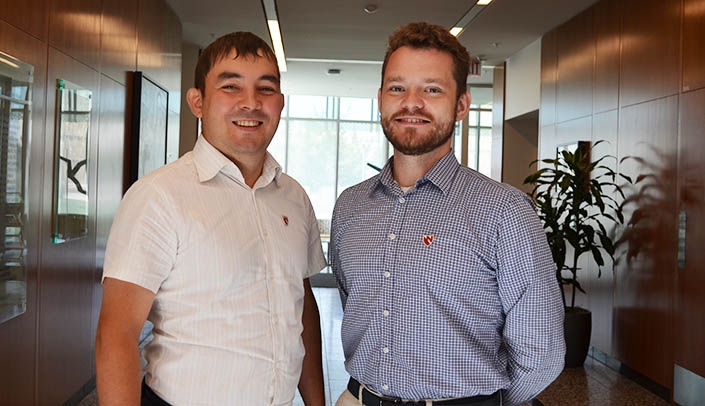Two faculty members from Kazan State Medical University (KSMU) in Russia have been at the UNMC College of Public Health for the past six weeks to explore how the educational systems can work together to provide more study and research opportunities for faculty and students from both countries.
Pavel Zinovyev, M.D., a psychiatrist, and Ildar Iskandarov, M.D., who teaches public health, medical informatics and biostatistics in the KSMU public health and health care department, both are working on their Ph.D. degrees in public health at KSMU.
They are here to follow up on a February visit by two KSMU leaders who signed a memorandum of understanding (MOU) with Chancellor Jeffrey P. Gold, M.D., to collaborate in public health programs.
Since 1922, public health has been taught in Russia in medical universities, and graduates are called doctors of preventive medicine. Few master’s of public health programs exist. Now, KSMU and UNMC see a great opportunity to start a joint public health program.
After spending countless hours in meetings with UNMC faculty members, Drs. Zinovyev and Iskandarov said they are still learning about the American medical and public health educational system, but now have determined how best to begin this collaboration.
Two concentrations in the College of Public Health will be recommended to launch the collaboration, Dr. Zinovyev said. “Later, we plan to expand this into a degree program.”
The two-year academic exchange program would be structured to provide students the first year of study at UNMC, and the second at KSMU, which is more practice-based. Online classes would supplement time spent overseas.
The visitors are most impressed with UNMC’s public health curriculum and find that it meets the demands of the job market here. They hope this exchange program will open up more career opportunities in Russia as well.
Health challenges for the population in Russia are similar to those in the U.S., but their focus is on two national goals — building healthy lifestyles, especially for people of reproductive age, and increasing life expectancy to 80 years of age by 2030. The average life expectancy is now 67 for men and 78 for women.
“We believe this exchange program will eventually help us build a workforce that will help us reach those goals,” Dr. Zinovyev said.
